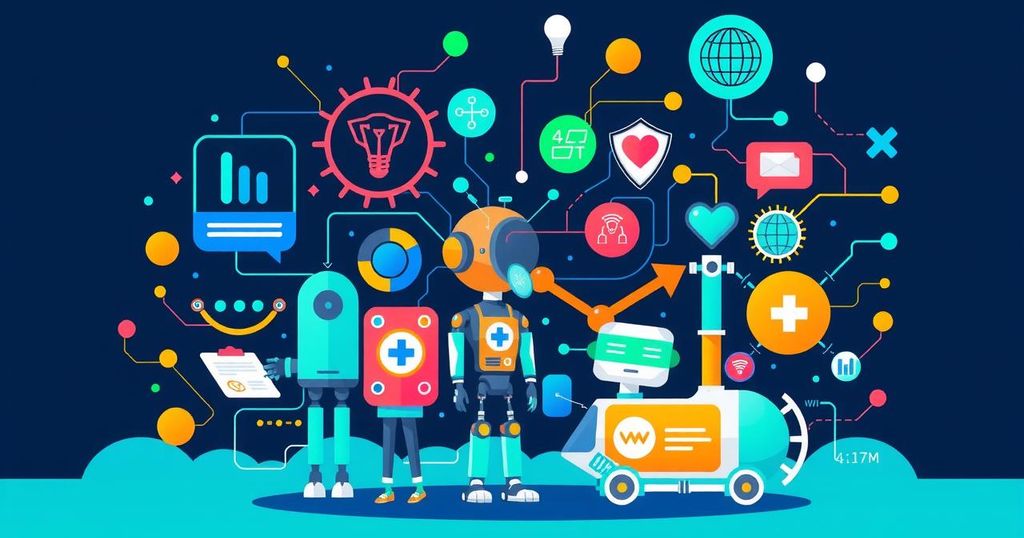Artificial Intelligence Market: Exploring Growth and Transformations Ahead
The AI market is projected to grow from USD 267.95 billion in 2024 to USD 6,096.76 billion by 2034, driven by advancements in various AI technologies across industries. Increased chatbot usage and automation in sectors like healthcare and customer service exemplify this shift, while ethical considerations and implementation costs present challenges. Nevertheless, the opportunities for innovation and collaboration within the market are extensive.
The global artificial intelligence (AI) market is booming, surging past USD 267.95 billion in 2024, with predictions to soar to USD 6,096.76 billion by 2034. This remarkable growth reflects a compound annual growth rate (CAGR) of 36.67% from 2025 to 2034. As AI permeates numerous industries, the demand for innovative solutions is escalating, fueled by advancements in deep learning, natural language processing (NLP), and machine learning techniques. These innovations enhance machine capabilities to understand human language, interpret visual cues, and perform autonomous tasks, thereby raising automation and improving human-machine interactions.
A standout example includes Meesho’s multilingual Gen AI-powered chatbot launched on November 26, 2024. Crafted to cater to diverse customer queries, the chatbot offers personalized support in languages like Hindi and English for users, even on basic smartphones and amidst noise. Handling 60,000 calls daily with an impressive 95% resolution rate, this technology minimizes the need for human intervention while enhancing user satisfaction.
AI’s adoption is expanding in crucial sectors, including healthcare, banking, and e-commerce, presenting fresh opportunities for growth. However, ethical considerations regarding privacy, algorithmic bias, and potential job losses pose challenges. The financial burden of implementing AI solutions and a shortage of skilled professionals are additional hurdles to widespread adoption. Nevertheless, the wave of AI-driven automation is creating ripe opportunities for emerging players in this market.
Customer service stands as a prominent sector transforming under AI. AI chatbots and virtual assistants are revolutionizing customer experiences by providing instant responses and personalized recommendations, ensuring businesses can efficiently interact with a growing volume of customer inquiries. The introduction of technologies like Google’s Gemini 2.0 exemplifies the shift toward more human-like AI capabilities, enhancing customer service interaction.
In manufacturing, AI augments traditional processes with robotics, revolutionizing efficiency and accuracy. Robots now undertake roles such as assembly, quality checks, and predictive maintenance, adjusting workflows in real-time for increased productivity. For instance, the collaboration between Google and Nvidia in March 2025 aims to enhance technological capabilities in robotics and drug development, demonstrating the extensive potential of AI across sectors.
Edge AI technology is set to expand, especially within IoT and edge computing realms. Unlike traditional AI, which relies on cloud computing, edge AI processes data on devices, thereby reducing latency and bolstering security. As smart IoT devices proliferate, edge AI becomes indispensable for real-time data management. April 2025’s collaboration among L&T-Cloudfiniti and AI startups underscores this transformation with a focus on enhancing efficiency through AI applications.
AI continues to push boundaries, venturing into realms that even supercomputers and quantum computers struggle to grasp. The report on AI market dynamics highlights growth prospects, challenges, and strategic options, incorporating analyses of competitive forces, supplier power, and buyer influence.
Significant technological advancements are redefining sectors, particularly through edge computing and generative AI models. According to CompTIA, nearly 97% of mobile users employ AI-prompted voice assistants, underscoring the pervasive integration of AI into daily life. AI-as-a-Service platforms are democratizing access to AI technologies for businesses of all sizes, further enhancing its economic impact.
Partnerships within the industry are increasingly common, fostering the development of innovative AI technologies. The COVID-19 pandemic remarkably accelerated businesses’ reliance on AI for improving customer engagement, highlighting its importance to revenue growth.
Several key factors drive AI market growth, including significant investments and strategic partnerships aimed at enhancing efficiency. For instance, Amazon’s $4 billion investment in Anthropic reflects the push toward developing foundational AI models. Cross-industry collaborations, such as CaixaBank’s alliance with Revelock for enhanced digital banking security, illustrate AI’s far-reaching applications.
AI’s impact on customer satisfaction through advanced applications is clear, with tools like generative AI enhancing marketing efforts. The role of cloud computing in making AI implementation more affordable for small businesses offers another growth avenue.
Regionally, North America dominates AI development with robust investments, while Europe leads in ethical AI practices. The Asia-Pacific region, represented by China and India, is rapidly advancing in AI, influenced by government initiatives. Latin America and parts of the Middle East are struggling to catch up due to infrastructure challenges but are making strides.
Recent collaborations such as those between HCLTech and AWS, along with product launches like Elon Musk’s Grok 3 AI chatbot, signal a thriving AI landscape as the technology continues to evolve.
The artificial intelligence market is on a spectacular growth trajectory, driven by technological advancements and industry-wide adoption across sectors. Key innovations such as edge AI and generative AI are reshaping interactions, transforming customer service, and enhancing operational efficiencies. Collaboration among major players and startups alike enhances market dynamism, although challenges like ethical concerns and implementation costs remain pertinent. Ultimately, the integration of AI into everyday processes hints at a future where this technology will be deeply interwoven in varied aspects of our lives.
Original Source: timestech.in




Post Comment